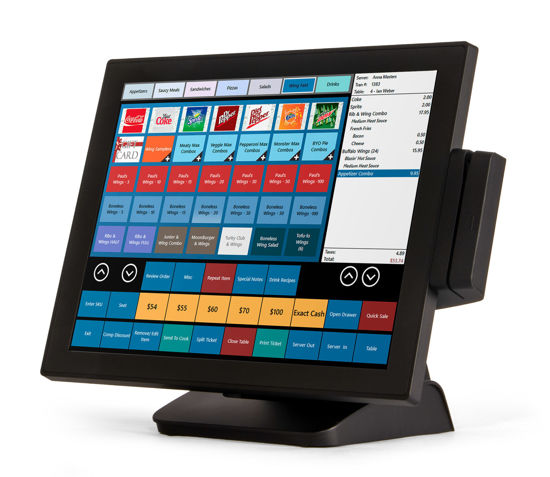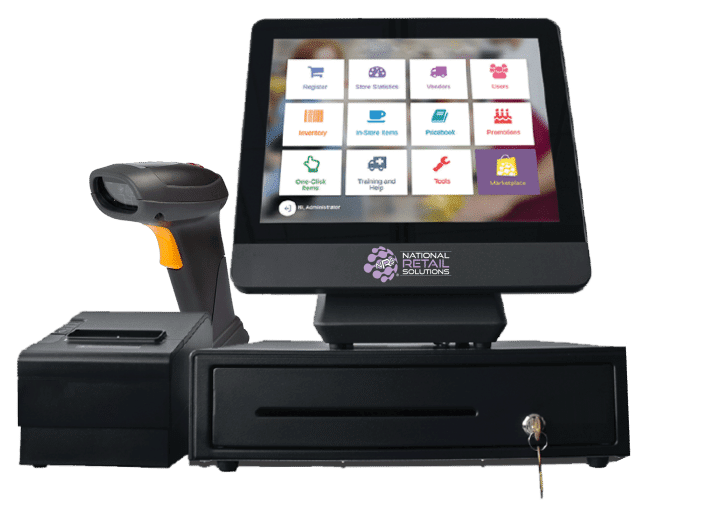Not known Details About Pos
Not known Details About Pos
Blog Article
Not known Facts About Pos

Clover POS: Retail Point-Of-Sale Solutions Streamline Transactions
8 Easy Facts About Restaurant Pos Shown

Hardware Parts of a Point of Sale System What makes a POS system tick? It's not just software; the hardware plays a starring function. Consider it as the body to the software application's brain. Without the right hardware, even the most advanced POS software is just a pretty face. Essential POS Hardware So, what are the must-haves? Let's break it down. The main processing system, often a computer or tablet, is the heart of the operation. The screen or touchscreen show permits staff to interact with the system. A barcode scanner speeds up the checkout procedure. Keep in mind the days of by hand going into each code? The reliable receipt printer offers clients with a record of their purchase. A cash drawer keeps your money safe and organized. A card reader permits consumers to pay with credit or debit cards. Diving Deeper: Beyond the Fundamentals But wait, there's more! Depending upon your business, you might require customized hardware. A restaurant may include cooking area printers to relay orders, while a retail store may utilize label printers for item tagging. Ever question how your regional bakeshop quickly prints those delicious-looking labels? Picking the Right Hardware: A Balancing Act Selecting the ideal hardware isn't almost buying the most costly equipment. It has to do with finding the sweet spot in between functionality, durability, and budget plan. A little service simply starting might choose a more standard setup, while a high-volume seller will require robust, high-performance devices. Is it much better to buy brand-new or utilized? Consider your options thoroughly. A brand-new system provides the most current technology and warranty defense, however a refurbished system can save you cash. The Future of POS Hardware What does the future hold? Anticipate to see even more integration with mobile phones, biometric scanners for employee authentication, and advanced analytics control panels showed on larger, clearer screens. Picture a world where stock is instantly upgraded in real-time as items are scanned-- a world where you can track your best-selling item from throughout the world. The possibilities are limitless, and the hardware is continually click here developing to fulfill the needs these days's services. Are you prepared to upgrade your point of sale system?
Software Characteristics and Capabilities: The Heart of Your POS System
Ever see an experienced barista glide through a hectic early morning rush? Their trick isn't just caffeine; it's a seamless dance with their POS system. The software is the conductor of your service symphony, managing whatever from sales to stock. However what notes should you be listening for? What abilities truly matter in today's market?
Inventory Management: Beyond Counting Beans
Forget spreadsheets that haunt your dreams. Modern POS systems offer real-time inventory tracking, informing you when your stock of artisanal coffee beans dips precariously low. Think about it as a digital guardian angel, preventing those uncomfortable "Sorry, we're out!" moments to clients. What if you could likewise predict need based on historical information? Numerous systems now provide forecasting tools, an effective weapon versus overstocking and lost sales. This assists avoid the predicament of running out of popular products or collecting excess inventory of slow-moving items, both of which can constrain money flow and area.
Sales Reporting and Analytics: Decoding the Data
Sales data is the brand-new gold, and your POS system is the miner. Forget just knowing how much you sold today. Dive deep into the data to uncover patterns, determine your best-selling products, and comprehend client habits. Which menu product pairs perfectly with the everyday special? Which promotion resonated most with your clientele? These insights are not simply fascinating; they're actionable intelligence. Without trusted sales reporting, navigating the intricacies of service decision-making ends up being like sailing without a compass, increasing the chance of errors and missed chances.
Customer Relationship Management (CRM): Structure Bridges, Not Walls
Remembering a regular customer's name and favorite order is lovely, but scaling that individual touch is difficult. POS systems with CRM capabilities permit you to track customer purchase history, choices, and even birthdays. Think of immediately using a discount on their birthday-- a small gesture that promotes commitment and encourages repeat company. But there is the possible snag of bad information quality, which can result in inaccurate consumer profiles and ineffective marketing efforts.
Payment Processing: Improving the Transaction
The checkout experience can make or break a sale. Smooth integration with various payment techniques-- credit cards, mobile wallets, even copyright-- is non-negotiable. Can your system handle split payments? Does it use secure tokenization to safeguard client data? A cumbersome payment procedure is like hitting a sour note in your business symphony, possibly disrupting the entire efficiency. Making sure compatibility with developing payment technologies and adherence to security requirements are vital for maintaining consumer trust and operational performance.
Staff Member Management: Keeping the Group in Sync
From clocking in and out to managing permissions and tracking efficiency, employee management features streamline operations and improve accountability. Is scheduling a problem? Many POS systems use incorporated scheduling tools, enhancing staffing levels based on anticipated demand. A typical obstacle that is frequently overlooked is the challenge of incorporating worker management functionalities with payroll systems, which can cause mistakes and inadequacies in wage estimations.
Advanced Characteristics: Leveling Up Your Operations
- Table Management: Ideal for dining establishments, this feature permits you to picture your dining room, track table status, and handle bookings.
- Commitment Programs: Reward your finest consumers and encourage repeat company with incorporated commitment programs.
- Online Ordering Integration: Perfectly incorporate your POS system with online buying platforms to expand your reach.
Picking the right POS system is about more than simply functionality; it's about finding a partner that can grow with your service. Consider your current requirements, anticipate future development, and do not be afraid to ask the difficult questions. The best software can change your company from a chaotic cacophony into a harmonious masterpiece.
Industry-Specific POS System Applications
Think of the local pastry shop, bustling with morning clients craving fresh croissants. A generic POS system might handle transactions, but can it handle complex dishes, track component inventory, or instantly adjust production schedules based on sales data? Most likely not. That is where the appeal of industry-specific POS systems shines.
Dining establishments and Hospitality
For dynamic dining establishments, speed and precision are paramount. The number of times have you seen servers handling orders, modifications, and splitting bills, all while trying to provide excellent service? A restaurant POS system enhances these processes, permitting for table management, cooking area order tickets, and even online purchasing combination. These systems frequently consist of functions like ingredient-level inventory tracking, vital for managing food expenses and reducing waste. Ever question why your preferred meal is sometimes not available? It might stem from an absence of proper stock management.
- Table Management
- Kitchen Order Tickets
- Online Buying Integration
- Ingredient-Level Inventory Tracking
Retail Solutions
Retail, with its varied stock and customer interactions, demands a various set of tools. Picture a shop clothing store having a hard time to monitor sizes, colors, and seasonal collections utilizing a standard checkout system. An industry-specific retail POS system provides features like barcode scanning, customer commitment programs, and detailed sales reporting. These systems can even integrate with e-commerce platforms, supplying a seamless omnichannel experience for consumers. Did you understand some retail POS systems can predict future sales trends based upon historical information? Now that is powerful!
The Hazards of an Inequality
Choosing the incorrect POS system can develop substantial operational hurdles. A clothing store utilizing a restaurant POS, for instance, would discover it unsuitable for handling inventory with sizes and colors. The absence of proper reporting and analytics might cause misinformed buying choices and lost earnings. The outcome might be comparable to trying to fit a square peg in a round hole.
Key Considerations
Selecting an industry-specific POS system needs cautious evaluation. Consider your organization's special requirements and operational workflows. Does the system incorporate with existing software application? Does it provide the essential reporting abilities? Is it scalable to accommodate future development? A well-chosen POS system is not just a deal tool; it's a strategic possession that can drive performance, enhance customer complete satisfaction, and eventually, increase your bottom line. Keep in mind, it is a financial investment in your company's future, not just a cost.
Security Considerations for Point of Sale Systems
Ever heard the tale of the mom-and-pop store that lost everything since of a single, neglected security flaw in their POS system!.?. !? It's a cautionary tale, and it highlights a critical aspect often overshadowed by the attraction of elegant features and structured operations. The reality is, a POS system is only as great as its security. What excellent is a system that crunches numbers in a flash if it allows wrongdoers to swipe consumer's information simply as quickly?
The Vulnerability Minefield
The digital landscape is a battleground. Every POS system, regardless of size or sophistication, is a prospective target. Are you truly got ready for the threats hiding around the corner? The genuine pinch comes when you discover that your out-of-date software has a gaping hole that hackers can exploit, turning your organization into an unwitting accomplice in identity theft. The trouble is that hackers are crafty and are always changing their techniques.
Common Security Spaces and Professional Tips
- Weak Passwords: "Password123" isn't cutting it. Use strong, unique passwords for all POS system accounts and alter them frequently. Two-factor authentication is a must.
- Unsecured Networks: Your Wi-Fi resembles leaving the front door open. Secure your network with strong file encryption (WPA3 if possible) and think about a different network for your POS system.
- Outdated Software Application: Software vendors patch security holes all the time. Failing to update is like welcoming problem. Set up automatic updates or schedule routine upkeep.
- Worker Training: Your personnel is your very first line of defense. Train them to recognize phishing efforts, protect passwords, and report suspicious activity.
Data Encryption: Your Guard Versus the Dark Arts
Think of information encryption as a secret code. It scrambles sensitive information, like credit card numbers, making it unreadable to unapproved users. Without encryption, your clients' financial details resemble sitting ducks, ripe for the picking by cybercriminals. It's not just about protecting your customers; it has to do with protecting your track record and avoiding large fines.
PCI Compliance: The Rulebook You Can't Overlook
If you accept credit cards, you're bound by the Payment Card Market Data Security Requirement (PCI DSS) It's a set of security standards created to protect cardholder information. Stopping working to comply can result in fines, charges, and even the loss of your capability to process credit card payments. It's a headache, yes, however it's an essential one. Think about PCI compliance as the cost of doing company in the digital age.
Consider this: every transaction processed through your point of sale is a prospective entry point for malicious actors. By implementing robust security measures, you're not simply securing your service; you're safeguarding your clients' trust and making sure the long-term practicality of your operations. The security of your POS system isn't just a technical issue; it's a business vital. It needs continuous watchfulness, proactive steps, and a dedication to remaining ahead of the curve.